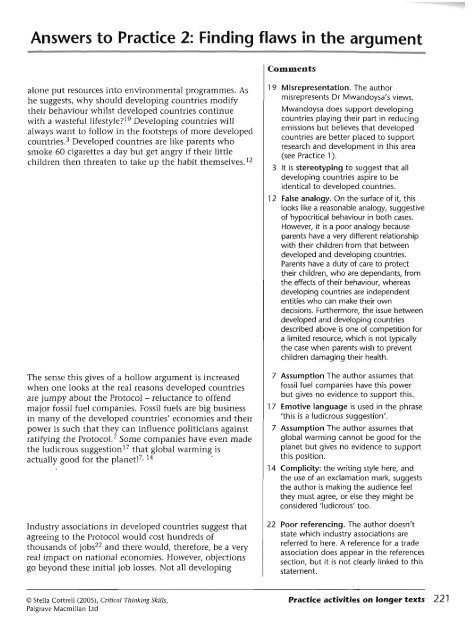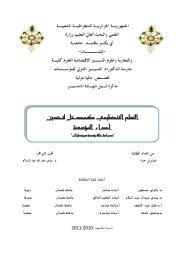Critical Thinking Skills - Developing Effective Analysis and Argument(2)
Critical Thinking Skills - Developing Effective Analysis and Argument(2)
Critical Thinking Skills - Developing Effective Analysis and Argument(2)
Create successful ePaper yourself
Turn your PDF publications into a flip-book with our unique Google optimized e-Paper software.
Answers to Practice 2: Finding flaws in the argument<br />
alone put resources into environmental programmes. As<br />
he suggests, why should developing countries modify<br />
their behaviour whilst developed countries continue<br />
with a wasteful lifestylelg <strong>Developing</strong> countries will<br />
always want to follow in the footsteps of more developed<br />
co~ntries.~ Developed countries are like parents who<br />
smoke 60 cigarettes a day but get angry if their little<br />
children then threaten to take up the habit themselve~.~~<br />
19 Misrepresentation. The author<br />
misrepresents Dr Mw<strong>and</strong>oysa's views.<br />
Mw<strong>and</strong>oysa does support developing<br />
countries playing their part in reducing<br />
emissions but believes that developed<br />
countries are better placed to support<br />
research <strong>and</strong> development in this area<br />
(see Practice 1).<br />
3 It is stereotyping to suggest that all<br />
developing countries aspire to be<br />
identical to developed countries.<br />
12 False analogy. On the surface of it, this<br />
looks like a reasonable analogy, suggestive<br />
of hypocritical behaviour in both cases.<br />
However, it is a poor analogy because<br />
parents have a very different relationship<br />
with their children from that between<br />
developed <strong>and</strong> developing countries.<br />
Parents have a duty of care to protect<br />
their children, who are dependants, from<br />
the effects of their behaviour, whereas<br />
developing countries are independent<br />
entities who can make their own<br />
decisions. Furthermore, the issue between<br />
developed <strong>and</strong> developing countries<br />
described above is one of comoetition for<br />
a limited resource, which is not typically<br />
the case when parents wish to prevent<br />
children damaging their health.<br />
The sense this gives of a hollow argument is increased<br />
when one looks at the real reasons developed countries<br />
are jumpy about the Protocol - reluctance to offend<br />
major fossil fuel companies. Fossil fuels are big business<br />
in many of the developed countries' economies <strong>and</strong> their<br />
power is such that they can influence politicians against<br />
ratifying the Protocol.' Some companies have even made<br />
the ludicrous suggestion1' that global warming is<br />
actually good for the planet!' l4<br />
Industry associations in developed countries suggest that<br />
agreeing to the Protocol would cost hundreds of<br />
thous<strong>and</strong>s of jobsz2 <strong>and</strong> there would, therefore, be a very<br />
real impact on national economies. However, objections<br />
go beyond these initial job losses. Not all developing<br />
7 Assumption The author assumes that<br />
fossil fuel companies have this power<br />
but gives no evidence to support this.<br />
17 Emotive language is used in the phrase<br />
'this is a ludicrous suggestion'.<br />
7 Assumption The author assumes that<br />
global warming cannot be good for the<br />
planet but gives no evidence to support<br />
this position.<br />
14 Complicity: the writing style here, <strong>and</strong><br />
the use of an exclamation mark, suggests<br />
the author is making the audience feel<br />
they must agree, or else they might be<br />
considered 'ludicrous' too.<br />
22 Poor referencing. The author doesn't<br />
state which industry associations are<br />
referred to here. A reference for a trade<br />
association does appear in the references<br />
section, but it is not clearly linked to this<br />
statement.<br />
O Stella CottreII (2005), <strong>Critical</strong> Tllinking <strong>Skills</strong>,<br />
Palgrave Macmillan Ltd<br />
Practice activities on longer texts 221



